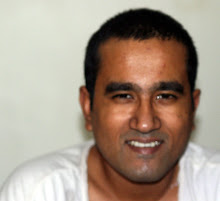
Chennai’s cultural calendar finally begins to shed the sluggishness of a long and well, not so torrid, summer…The Metro Plus’ theatre fest has just rolled out its third edition, with a very international flavour, while Krishna Gana Sabha’s Gokulashtami concert series, running in parallel, is about as local as it gets…The Landmark Quiz lurks around the corner after which the city’s cultural scene should follow the pleasant example of the weather – Carnatica’s Bharat Utsav and the Hindu’s Classical Music Fest being among the events likely to throw up some dates you might want to block – leading upto the big daddy of Margazhi, the Music and Dance festival. Chennai is not quite Paris yet but it’s getting there….
Alas, the Music Academy IS a far cry from the Odeon. The Manipuri troupe that kicked off proceedings was disappointed with the size of the stage (a complaint that also surfaced during the Bavarian State Orchestra’s performance under Zubin Mehta’s baton a couple of years ago). The audience has its share of cribs as well. The scandalously cramped seats in the balcony haven’t yet seen the light of N Murali’s promises to rectify the ergonomic disaster that is the Academy auditorium.
The crowds seem to have voted with their feet – attendance was between 60-70% in the stalls and about 30% in the balcony. Not too many plays had less than 75% last year. One shudders at the thought of a laudable movement being reversed by audience apathy. C’mon folks – give that remote a break!
Men of Letters
I can’t remember any of the blurbs using “Experimental” as a prefix to the Theatre Festival but that’s pretty much what the plays on offer appear to suggest: A Manipuri dance-ballet in Meithei (Nine Hills One Valley), a play woven around a collection of press clippings (Three Strangely Normal Plays), a recitation of letters exchanged between Nehru and Gandhi (Dear Bapu)…whatever happened to good old screenplay? Is it any wonder that N Ram is willing to cough up a lakh of rupees for one?!
Anyway, the last of the above (Director - Mohan Maharishi) was unexpectedly engaging, giving even a small-time history buff like yours truly, some novel insights into the minds of the 2 chief architects of India’s post-colonial history. The parts were played (or should I say “read”) with flawless, if a little affected, eloquence by Bhaskar Ghose and Sunit Tandon. “Is-yous” for example takes you right back to Doordarshan News of the 80s with which, of course, both these gentlemen were intimately associated! Sabina Mehta was somewhat less inspiring in her role of providing random annotations to the epistolary exchange, slipping up once too often during her obiter dicta.
Magic Realism
It’s odd how closely one is able to relate to the equation between the two congress leaders, one that is defined as much by mutual respect as by a passionate difference of opinion – anyone who’s had a benevolent but overbearing boss, if there’s any such thing, would know what I am talking about.
Notwithstanding his remarkably forward-looking views on women’s empowerment, religion and the caste system, Gandhi’s muddle headed approach to socio-economic issues (in particular, his utopian ideal of a village based economy) is a source of endless frustration for an impatient socialist zealot with a clearly mapped out industrial vision for his country. Nehru’s directness and rationalism also come into conflict with the unfathomable methods of his senior colleague who, for all his principles, possessed a Machiavellian political mind and an extraordinary feel for the pulse of both the masses, and the rulers. Bursts of unreasonable irascibility followed by tactical retreats, a carrot in one hand and a stick in the other – Gandhi was a master manipulator whose ends Nehru could grasp only when he’d pull the occasional rabbit out of his hat – using a complete non-issue like the Salt Tax, for example, to set an entire country on fire (“magician” is a word Nehru uses repeatedly while referring to his mentor).
That a nation could emerge from such a Babel (we haven’t even touched upon Patel, Rajaji, Bose or Ambedkar – all political animals of different hues) was a minor miracle. And the fact that such a bhel-puri of ideologies has survived over 50 tempestuous years must rank as one of the most remarkable developments in modern history. But looking back, a cacophony of voices was probably the only thing that could’ve stitched together 300 million very diverse, and very opinionated, individuals…and oh! Despite all its holes, what a magnificent fabric we have woven, my countrymen!
A though-provoking pile of letters indeed…

No comments:
Post a Comment